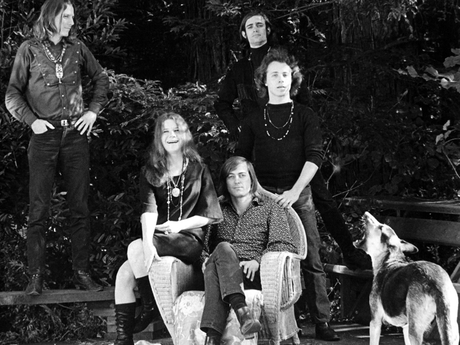
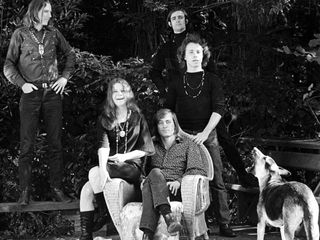
Big Brother And The Holding Company, 1968 (from left): James Gurley, Janis Joplin, Sam Andrew, Dave Getz, Peter Albin - and Mishka the dog.
"I only played with Janis for two and a half years, but we crammed a lot into that short time," says Sam Andrew, co-founder and co-guitarist (along with James Gurley) of Big Brother And The Holding Company, one of most explosive musical forces to come out of San Francisco and the band which catapulted Janis Joplin to legend. "We were constantly exploring and reaching. The era let us do that. It was exciting."
Although Big Brother And The Holding Company are now thought of as Joplin's backing band, the truth is, the singer joined the group (which also included drummer Dave Getz and bassist Peter Albin) after they had firmly established themselves as one of the Bay Area's prime movers. "Janis was part of the band," says Andrew. "Eventually, she went off on her own, but when she was with us, we were a team."
To get a good idea of what the group sounded like in their heyday, check out the just-released Live At The Carousel Ballroom, recorded 23 June 1968, just months before Joplin split the band to form (along with Andrew) the short-lived Kozmic Blues Band. The 14 tracks on the live set, recorded by the legendary Owsley Stanley aka "Bear," show off the anything-goes, serpentine guitar interplay between Andrew and Gurley, a dynamic musical conversation which virtually defines the term "psychedelic."
MusicRadar sat down with Andrew recently to talk about his memories of playing with Janis Joplin, how he worked out his parts with James Gurley, and which guitars and amps went into the sound that shaped an era.
How would you describe Big Brother pre-Janis?
"Very free and very ignorant. [laughs] In the beginning, we were an experimental band. We'd just play - no key, no goal in mind, no tempo, no idea. We wanted to take people on a journey.
Get the MusicRadar Newsletter
Want all the hottest music and gear news, reviews, deals, features and more, direct to your inbox? Sign up here.
"I remember one song we did where we took a hot plate, set it on an amplifier and cooked some bacon in it. We played while the bacon cooked, and when it was done we stopped playing and ate the bacon. [laughs] Our tunes were very long and flowing, and that kind of changed when Janis joined the band. That's when we had to learn to play with a real singer."
How did Janis come to join?
"We had a manager, Chet Helms, who had gone to school at the University of Texas in Austin. Janis was singing in bluegrass bands in Austin, and Chet was hanging around with her. He was very impressed with her and offered to bring her out to San Francisco.
"She walked in one day and started singing some songs. It wasn't like she was auditioning; she was coming to join the band. I remember when she opened her mouth and started to sing, I thought, 'Wow! That sounds really authentic.' It sounded like she was from the '30s or '40s - a real singer."
How did things change once Janis was in?
"Her' voice was amazing, so we tailored our music to go along with that. But she was good about letting us stretch out and play; she was cool with instrumentals. She was a real musician, a real artist. Our music became more arranged with her involvement.
"At first, she had a coffeehouse kind of voice - real big and wide and open, like an acoustic instrument almost. As she got to play with us, she learned how to be an electric singer. We played so loud that she had to compete, so that's when she started screaming. But she was always very musical.
"Janis loved listening to great singers. She was really into Otis Redding, as was I. We were with him at Monterey. Janis was quite taken with him. Tina Turner, too, who was a great friend of ours. And the whole Stax/Volt thing - Janis was really into those records, like we all were."
What was Janis like as a person?
"You know how people say 'He's a real stand-up guy'? Janis was a real stand-up woman. She always did what she said she was going to do. She would never promise to do something and not come through. She was a really good co-worker - always showed up on time, very responsible and professional.
"Janis was funny, too. She was funny like Phyllis Diller - she was hilarious. There were always a lot of laughs when Janis was around."
Let's talk about your guitar playing with James Gurley. How did the two of you work out your parts?
"We rehearsed a lot - every day. At first, we just didn't have anything else to do. We enjoyed it. It was a funny relationship, though: I could never sit down with James, like I would with Janis, and say, 'That passage here, what if we played in thirds?' Because he'd start laughing; he couldn't relate to music that way. Our communication was non-verbal; the guitars did the talking. We had a very instinctive thing musically. It was powerful."
Gear-wise, what did you two like? You played some Telecasters, but you were mostly an SG guy, right?
"Mostly SGs, that's right. The amps changed more than the guitars, but the guitars changed over time. What happened was, we signed with Columbia Records, and Columbia owned Fender, so we got a lot of Fender equipment, amps and guitars. We got a Coral electric sitar, too, which was real interesting.
"I preferred the SGs. They went out of tune because the necks were real thin. But they were good guitars. I always thought Gibson guitars were like General Motors, like a Cadillac or a Buick. Fenders were like Fords - light and hot-rodded."
So why was the recording of the Carousel Ballroom concert locked away for so long?
"I'm not really sure. I know that Owsley recorded a lot. He had a lot of tape - I can't even imagine what they're going to do with all of it. Most of his recordings were of The Grateful Dead. We knew there was a tape of the show, because we saw him recording at the time. He called me a couple of years ago to come and listen to it, and you know, here we are."
The live version of Combination Of The Two is a real sonic explosion. Were you and James influenced at all by Jimi Hendrix?
"Not really. When Cheap Thrills came out, we didn't know Hendrix. We met him at Monterey. Everything was formed sonically before then. I guess we were all going for the same thing. James had a physical approach to sound. That comes through in Combination Of The Two - that's him soloing."
There's so much going on in the song Summertime. It's an opus. How long did it take you and James to figure out what you were going to do?
"A long, long time considering the fact that we didn't speak the same language at all musically. With that song, I heard Nina Simone singing the Gershwin tune You're So Nice To Come Home To, which is in a minor key. The way the lines weave in and out were so beautiful, I thought, Hey, I'm going to try that on Summertime.
"I didn't suggest anything to James. I played my lines, and he played his in response to what I did. Again, his approach was very physical, kind of like Hendrix."
The solo on Come On Me is wonderfully composed, but it's the sound really jumps out at you. The amps are just rippling!
"Well, we turned up loud, that's for sure. [laughs] But you know, that's all we did. We didn't have effects. Maybe we had a fuzz pedal, but that was real late in the game. We just turned the amps up and let them do their thing - and that probably overloaded the microphones."
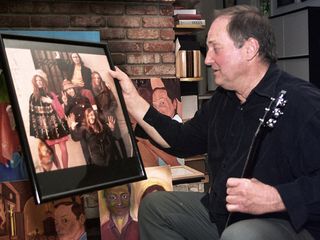
Sam Andrew, pictured in 2007, gazes at a photo of Big Brother And The Holding Company from 1967. © STAFF/X01095/Reuters/Corbis
Why did you and Janis leave Big Brother?
"I'm blaming that on her, because she's not here and can't defend herself. [laughs] It was a really stupid decision, but she talked me into it. I wish I had been stronger and said no. She felt like some of the people in Big Brother weren't working as hard as we were - and that was the truth. She was getting impatient. Plus, she wanted to have a soul band - she was getting into that phase. So I went with her. I was curious to see what would happen. And I liked her, too. I related to her probably better than to anyone else in the band."
Eventually, you came back to Big Brother.
"Yeah, because Janis fired me! That's what happened there. The Kozmic Blues Band was a constantly sinking ship. They started throwing things overboard, and I think I was the first large thing to go."
You've said what a hard worked Janis was. Were drugs ever an issue with her performing?
"I don't think so, and drugs were never an issue with me - I loved doing drugs as much as anyone. I was right there with her. Our bass player, Peter, never did any drugs at all, which was pretty strange in the '60s. Janis and I tried never to do anything in front of him; we always wanted to respect his wishes.
"When Janis and I left the band, we probably went a little crazy. The times in general were a little crazy. Right then it probably became an issue, yes… "
Where were you when you heard of her death?
"We were in Marin County. Her equipment manager called us from Los Angeles - she was in Hollywood, which is where she died - and he told us she was dead. We had a little wake for her, talked about her, played some music. A lot of people were dying that year.
"I don't know what it is about the age of 27. It's a hard year to get over. So many artists… and that continued with Amy Winehouse. Musicians have trouble with 27. There are these crisis points that are hard to get past - 26 and 27 are big ones."
Joe is a freelance journalist who has, over the past few decades, interviewed hundreds of guitarists for Guitar World, Guitar Player, MusicRadar and Classic Rock. He is also a former editor of Guitar World, contributing writer for Guitar Aficionado and VP of A&R for Island Records. He’s an enthusiastic guitarist, but he’s nowhere near the likes of the people he interviews. Surprisingly, his skills are more suited to the drums. If you need a drummer for your Beatles tribute band, look him up.
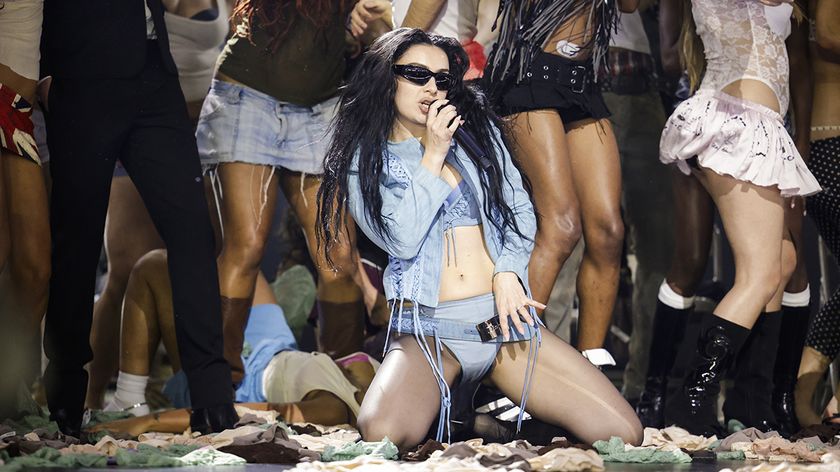
“The verse tricks you into thinking that it’s in a certain key and has this ‘simplistic’ musical language, but then it flips”: Charli XCX’s Brat collaborator Jon Shave on how they created Sympathy Is A Knife
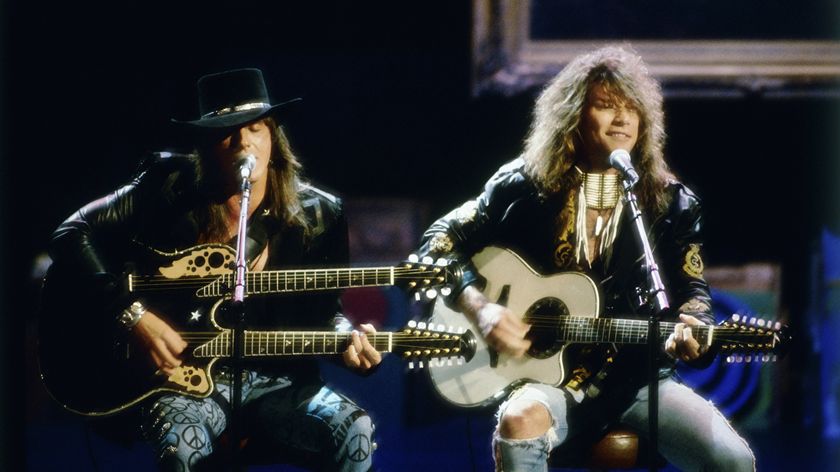
“I’ve seen a million faces and I’ve rocked them all!”: Was Bon Jovi’s 1989 acoustic performance really the inspiration for MTV Unplugged?

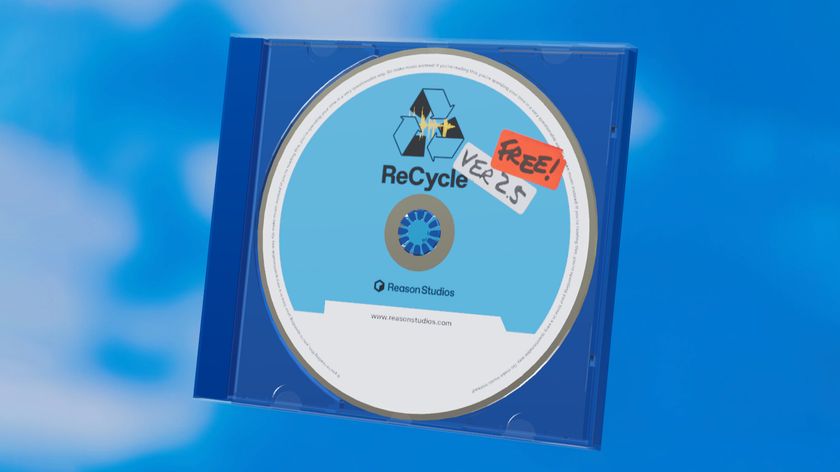
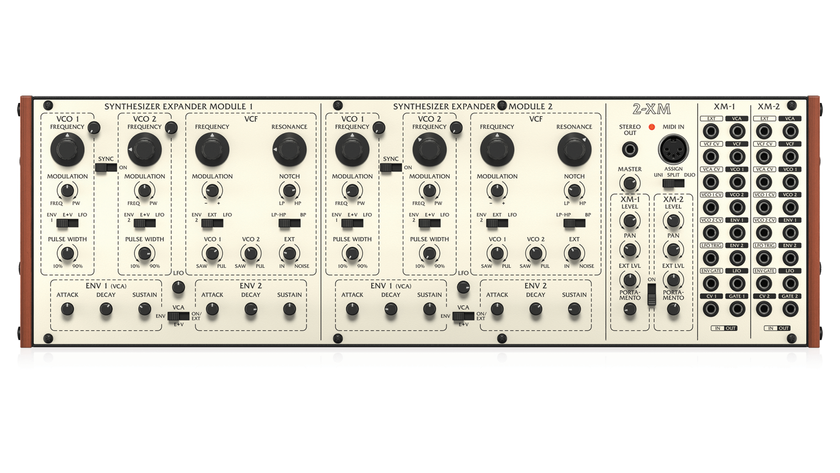
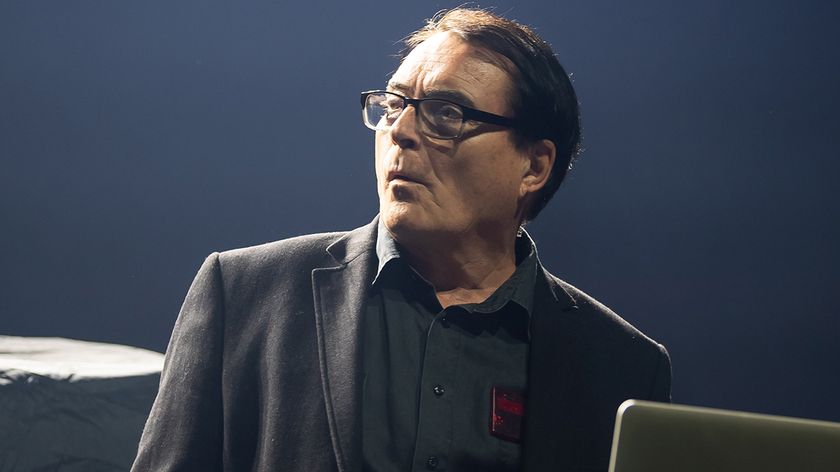
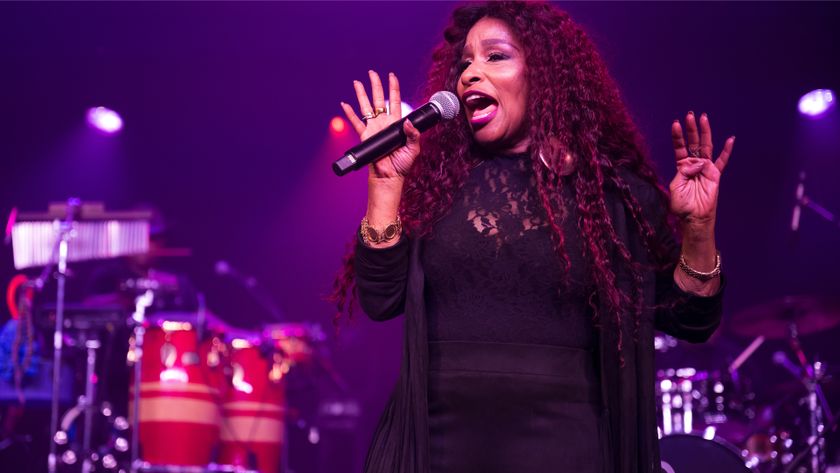
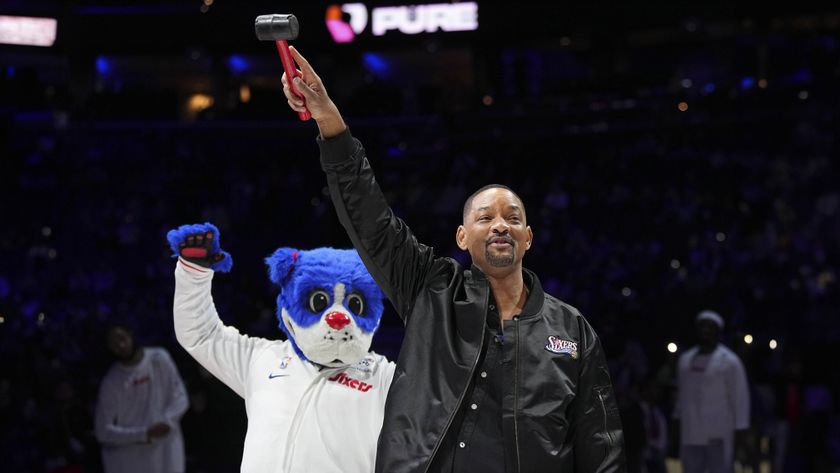


![Chris Hayes [left] wears a purple checked shirt and plays his 1957 Stratocaster in the studio; Michael J. Fox tears it up onstage as Marty McFly in the 1985 blockbuster Back To The Future.](https://cdn.mos.cms.futurecdn.net/nWZUSbFAwA6EqQdruLmXXh-840-80.jpg)